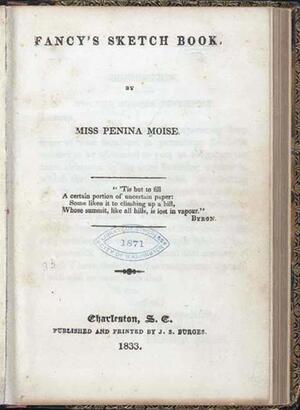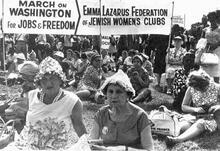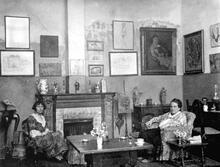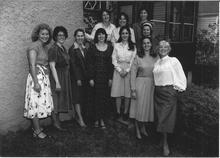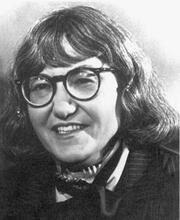Penina Moïse
Penina Moïse was born in 1797 to a large and wealthy family in Charleston, South Carolina. Moïse was a prolific writer, earning praise for her 1833 collection of poems, Fancy’s Sketch Book, as well as her articles for various newspapers across the country. She wrote 190 hymns for her congregation, Beth Elohim. The Reform movement’s 1932 Union Hymnal included over a dozen of her hymns. Moïse was also a gifted teacher and, in 1845, became superintendent of Beth Elohim’s Sunday school. After the Civil War, in which she staunchly supported the Confederacy, she returned to Charleston and ran an academy with her sister and niece. Though her eyesight eventually deteriorated into blindness, she continued to work and write until the end of her life.
“Three cheers for California Mountain Wine! ... a beverage so pleasant, and exhilarating, as to make one oblivious to temperance pledges, and which possesses a spell, as potent as that of any table rapper, for raising spirits,” wrote a poor, nearly blind, and ailing Penina Moïse in a letter dated 1875. Despite her suffering, she demonstrated an unflagging poetic wit and love of life. Moïse, an early Jewish educator, was one of nineteenth-century America’s best-known Jewish poets. Appreciated in her own day for her literary skill and sense of humor, Moïse is relatively unknown to present-day readers.
Early Life and Family
Penina Moïse was born on April 23, 1797, to a large and wealthy family in Charleston, South Carolina. Her father, Abraham, was a successful Alsatian-born merchant. Her mother, Sarah, was the daughter of a wealthy family from the island of St. Eustace, where she met and married Abraham in 1779. They came to Charleston in 1791, fleeing a slave insurrection. Moïse was the sixth of nine children and the youngest daughter. Her brothers, Cherie, Aaron, Hyam, and Benjamin, were born in the Caribbean. Her older sister Rachel and her younger brothers, Jacob, Abraham, and Isaac, were born in the United States. She left school at age twelve, after her father’s death. Moïse served as the family nurse, caring for her mother and brother Isaac, an asthma sufferer. Always nearsighted, during the Civil War her eyesight deteriorated into blindness.
Moïse grew up in the presence of a diverse, vital, and well-integrated Jewish community, devoting herself to Jewish issues. She was encouraged in her poetry by her brother Jacob and sister Rachel, and her work appeared in both the Jewish and general press. Her 1833 collection of poems, Fancy’s Sketch Book, was the first by a Jewish American woman. Moïse also wrote columns for newspapers throughout the United States. Her poetry covered a variety of topics, including current events, politics, local life, Judaism, Jewish rights, and Jewish ritual reform.
Teaching and Education After the Civil War
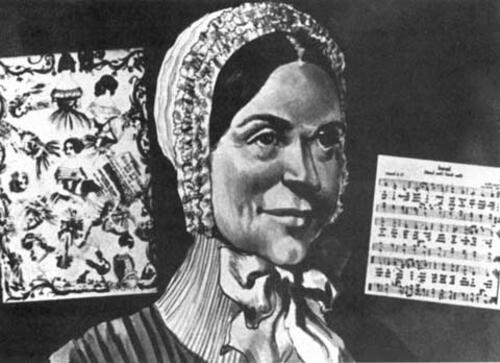
Courtesy of the Jacob Rader Marcus Center of the American Jewish Archives, Cincinnati, OH, www.americanjewisharchives.org and the National Federation of Temple Sisterhoods.
Along with her literary endeavors, Moïse devoted her life to teaching. In 1845, she became the second superintendent of Congregation Beth Elohim’s Sunday school. The Civil War forced Moïse to leave Charleston for Sumter, South Carolina. Returning after the war in much reduced circumstances, she supported herself by running an academy together with her widowed sister and her niece. Though self-conscious about her poverty, she accepted it with humor and grace.
Death and Legacy
Moïse was the first Jewish American woman to contribute to the worship service, writing 190 hymns for Beth Elohim. The Reform movement’s 1932 Union Hymnal still contained thirteen of her hymns.
Penina Moïse died on September 13, 1880, in Charleston. Her life, reminiscent of the life of Rebecca Gratz, exemplifies the choices available to Jewish American women of her era and class. She sustained her deep spiritual commitment to Judaism throughout her life, albeit to a Judaism transformed by Protestant aesthetics and American political thought. Though her poetry did not maintain its popularity, her work attests to her great intellect and indomitable spirit.
Adams, Charlotte. Critic 15 (1895): 327.
AJYB 7 (1905–1906): 17–31.
Appleton’s Cyclopaedia of American Biography (1887. Reprint 1968).
BDEAJ.
DAB.
Dinkins, S.A. “Penina Moïse.” American Jews’ Annual 5646 (1885–1886), ch. 5.
EJ.
Elzas, Barnett A. The Jews of South Carolina (1905).
Hagy, James W. This Happy Land (1993).
JE.
Kayserling, M. Die Jüdischen Frauen (1879).
Markens, Isaac. The Hebrews in America (1888).
Moïse, Penina. Correspondence File. American Jewish Archives, Cincinnati, Ohio.
NAW.
UJE.
Zola, Gary Phillip. Isaac Harby of Charleston, 1788–1828 (1994).

